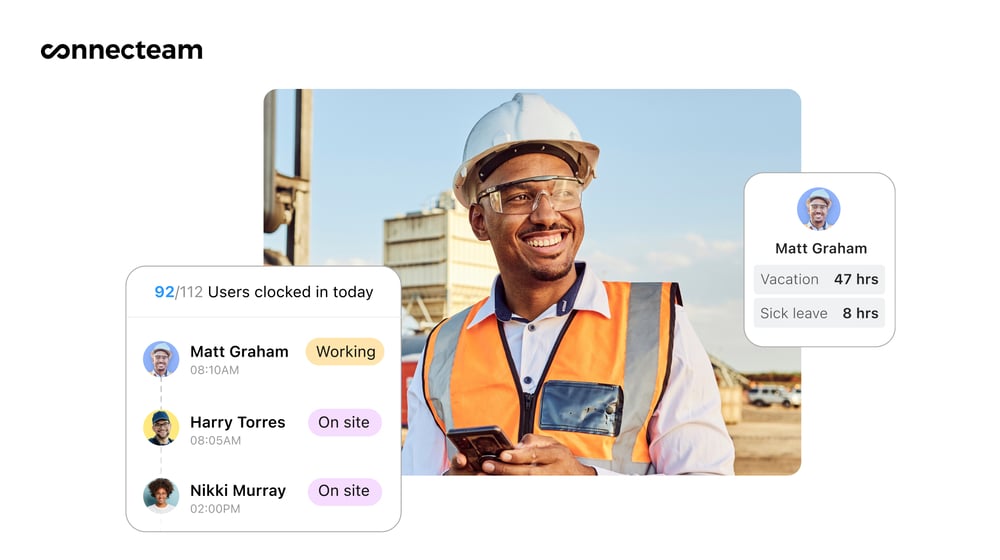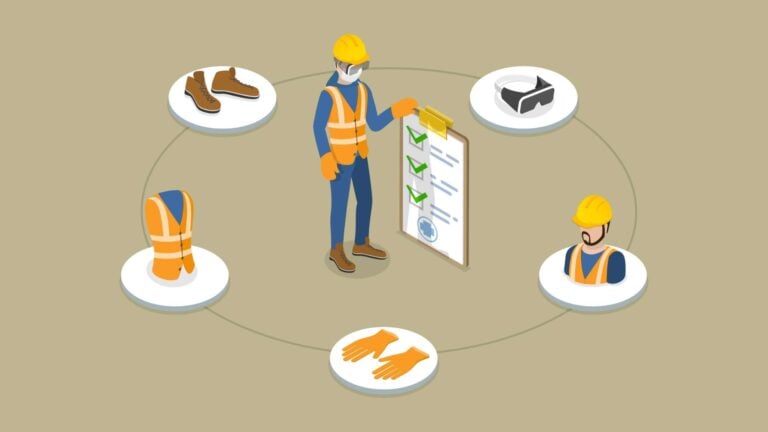With the global construction industry poised to be a market behemoth, reaching a staggering $17.2 trillion by 2030, there’s never been a better time to break ground on your successful construction business.
I have collected 35 profitable ideas, covering everything from specialized trade-based businesses to administrative services.
You can offer any of these ideas as a standalone business or as an added service to distinguish your company from the rest of the competition.
35 Profitable Construction Business Ideas
Home Remodeling & Renovations Business
Average startup cost: $5,000 to $25,000
Home remodeling and renovations bring a homeowner’s vision to life, whether updating a kitchen to make it more user-friendly or turning a dusty attic into a cozy home office.
The key to success here is not just about hammering nails and tearing down walls; it’s about understanding the homeowner’s needs and lifestyle.
Plus, staying on top of trends in the construction industry, like smart home technologies or sustainable materials, can make your services stand out.
Building a solid portfolio with before and after photos and getting customer testimonials helps spread the word about your work and will help you ensure future work.
Painting Business
Average startup cost: $2,000 to $35,000
A painting business is a great way to enter the commercial construction industry because everyone needs a fresh coat of paint now and then.
This business can be as simple as repainting a room or as complex as restoring historical exteriors.
What can set you apart is not just your ability to pick up a brush but your knowledge about what types of paint to use where – like moisture-resistant paints for bathrooms or eco-friendly options for children’s rooms.
Offering color consultation can add value, helping clients choose the perfect shades to make their spaces look bigger, brighter, or cozier.
With relatively low startup costs, a painting service can quickly turn into a profitable business.
Clean, quick work and clear communication can turn one-time clients into regulars.
This Might Interest You
Explore in-depth strategies for managing a thriving construction business with our guide on running a construction business.
Cement and Concrete Supply Business
Average startup cost: $100,000 to $250,000
The cement and concrete supply business is crucial to every construction company. Every building project, big or small, needs these materials.
Starting a cement retailing business means being reliable and understanding what different projects need.
It’s not just about delivering bags of cement to construction sites; it’s about offering solutions like quick-dry concrete for tight deadlines or weather-resistant options for outdoor projects.
Keeping up with new developments, like eco-friendly or lightweight concrete, can give you an edge over competitors.
Did You Know?
Concrete is the most widely used man-made material in the world, used more than twice as much as steel, wood, plastics, and aluminum combined.
Networking with local builders and contractors and understanding their projects can help you offer personalized service, making you a valuable part of their team.
Startup costs are not neglectable and can quickly skyrocket if you want to build a cement manufacturing plant.
However, your chances of building a profitable and thriving business venture are high since the construction industry only keeps growing.
Plumbing Business
Average startup cost: $1,500 to $30,000
Running your own plumbing business is about much more than fixing leaks and unclogging drains. It’s about providing essential services that keep homes and businesses running smoothly.
Becoming a trusted plumber means being on call for emergencies and offering solutions that fix problems and prevent them in the future.
With an increasing focus on sustainability, green plumbing services like rainwater harvesting systems or efficient fixtures can appeal to eco-conscious customers.
Also, respecting people’s homes and spaces, cleaning up after work, and offering fair prices can build a loyal customer base.
Did You Know?
A leaking faucet can waste more than 3,000 gallons of water per year, highlighting the importance of regular maintenance and efficient plumbing services.
Pool Service Business
Average startup cost: $2,000 to $10,000
If you love working outdoors and don’t mind getting wet, a pool service business could be right up your alley.
Beyond cleaning, this business involves checking and balancing chemicals, maintaining equipment, and even guiding clients to efficiently heat their pools.
You can also offer pool construction and maintenance rather than only servicing pools.
Educating yourself about different pool systems and water treatments can make you an invaluable resource, especially when you can offer cost-saving and eco-friendly solutions.
Building strong relationships with clients through regular updates and transparent services can turn seasonal work into year-round contracts.
Paving Business
Average startup cost: $10,000 to $50,000
In the paving business, your work lays the groundwork for daily life, from driveways to public pathways.
Success in this area comes from laying down asphalt or concrete and understanding the best materials and techniques for different uses and climates.
For instance, offering permeable paving solutions can attract clients looking for environmentally friendly options.
Providing transparent, detailed quotes and finishing projects on time can build your reputation for reliability.
Remember, a well-done pavement project is visible to everyone and can serve as a walking advertisement for your work.
Sandblasting Business
Average startup cost: $2,000 to $10,000
Sandblasting, while niche, is essential for preparing surfaces for painting, treating, and cleaning old buildings without damaging them.
This business requires understanding different blasting mediums and techniques for various applications.
For example, using softer media like walnut shells for delicate surfaces can avoid damage.
Safety is a massive part of this business, both for the operator and the environment. Offering mobile services can expand your market, making you accessible to more clients.
Educating your clients on the benefits and safety measures of sandblasting can set you apart as an expert in your field.
Solar Panel Installation Business
Average startup cost: $45,000 to $140,000
Starting a solar panel installation business taps into the growing demand for renewable energy.
This is more than just mounting panels on roofs; it’s about helping homeowners and businesses reduce their energy bills and carbon footprints.
You’ll need to understand different types of solar systems and how they fit with various roofing materials and architectural styles.
Did You Know?
Solar energy jobs are growing 12 times faster than the US economy, reflecting the booming demand for renewable energy solutions.
Looking for a name idea to your Eco friendly business? Visit here
Offering services like energy audits, system construction and maintenance business, and financing options can make solar panels accessible to more people.
Educating your customers on the benefits and potential savings of solar energy can also help break down barriers to entry.
As solar technology evolves, staying updated on the latest trends and incentives can keep your business competitive and environmentally impactful.
Roofing Services
Average startup cost: $2,000 to $20,000
A reliable roofing service is always in demand because it protects everything underneath it.
This business is not just about laying shingles; it’s about ensuring homes and buildings are leak-free, insulated, and ventilated properly.
Understanding the latest materials and techniques, such as cool roofing options for energy efficiency or green roofs, can set your service apart.
Pro Tip
Offer annual inspection services to identify potential issues before they become major problems. This can lead to regular income and client trust. Use our residential building inspection checklist template to standardize your inspection workflow.
Offering regular inspection and roof maintenance packages can also provide steady income and prevent major issues for your clients.
Good communication, especially after severe weather events, can position your business as a trusted advisor in times of need.
Floor Maintenance Business
Average startup cost: $2,000 to $25,000
Floors take a beating from daily foot traffic, pets, and spills. Starting a floor maintenance business means you’ll be in charge of keeping them looking their best.
This involves more than just mopping and polishing; it’s about understanding different materials, from hardwood to carpet to tile, and how to care for each properly.
Did You Know?
Hardwood floors can increase a home’s market value and are one of the top requests from homebuyers.
Offering specialized services, like stain removal, grout cleaning, or eco-friendly options, can cater to niche markets and increase your clientele.
Regular maintenance contracts with businesses, like hotels or office buildings, can provide steady work and income.
Pro Tip
Offer annual inspection services to identify potential issues before they become major problems. This can lead to regular income and client trust.
Create a construction quality control plan (CQCP). A well-designed CQCP acts as a safeguard against issues, ensuring top-notch quality, reducing potential risks and costs, and ultimately boosting your reputation.
Aluminum Products Manufacturing Business
Average startup cost: $25,000 to $50,000
Aluminum is a versatile and sustainable material, making an aluminum products manufacturing business a smart investment.
This could range from window frames and doors to automotive parts and packaging.
Success in this industry requires understanding the properties of aluminum and staying updated with manufacturing technologies.
Offering customization services or focusing on eco-friendly and recyclable products can meet growing market demands.
Building relationships with suppliers and understanding your customers’ needs, whether they’re contractors or end consumers, are key to staying ahead.
This Might Interest You
Want to learn how to run a small construction business? Our guides to how to start a construction business in 5 steps and types of and salaries for construction jobs can help you get started .
Carpentry Business
Average startup cost: $10,000 to $50,000
Carpentry is an age-old craft that remains essential in construction and renovation.
Starting a carpentry business could involve creating custom furniture, installing cabinetry, or building structures.
What sets a good carpentry business apart is attention to detail, craftsmanship, and customer service. Specializing in a niche, like sustainable materials or historic restoration, can attract specific clientele.
Offering design consultation can add value to your services, turning simple projects into bespoke solutions.
Building a portfolio of your work and sharing it online can attract new customers and showcase your skills.
Door Business
Average startup cost: $10,000 to $60,000
Doors are both functional and symbolic, offering security and a first impression. A business focusing on doors can cover installation, repair, and customization.
Staying knowledgeable about different materials, from classic wood to modern composites, and understanding security features are essential.
You could expand your market by offering energy-efficient or custom-designed doors.
Providing maintenance services or annual check-ups can lead to repeat business and ensure the longevity and functionality of the products you install.
Borehole Drilling Business
Average startup cost: $250,000 to $1,200,000
Water is a necessity, and in many areas, borehole drilling is essential to access it.
This business involves surveying, drilling, and maintaining wells for residential, agricultural, or commercial use.
Understanding geological factors and water safety standards is crucial.
Offering comprehensive services, from obtaining permits to regular water quality testing, can provide added value to your clients.
Staying updated on environmental regulations and drilling technologies can improve efficiency and sustainability, making your services more appealing to a wide range of customers.
Site Clearing Business
Average startup cost: $2,000 to $150,000
Site clearing is essential for any construction or landscaping project, making this business both necessary and lucrative.
This job involves removing trees, stumps, brush, and debris to prepare land for construction or new growth. It’s not just about clearing land; it’s about understanding how to do it safely and efficiently, respecting local regulations and the environment.
For example, knowing how to handle potentially hazardous materials or protecting local wildlife can set your business apart.
Offering recycling options for cleared materials can also appeal to eco-conscious clients.
Building strong relationships with local contractors, landscapers, and developers can provide steady work and referrals.
Construction Equipment Rental Business
Average startup cost: $800,000 to $1,000,000
This business is about more than just selling or renting out machinery; it’s about providing solutions to construction challenges.
Understanding the needs of your clients and the specifics of their projects can help you recommend the right equipment, which builds trust and loyalty.
Offering flexible leasing terms or rent-to-own options can cater to smaller contractors who might need more funds to purchase outright.
Staying updated on the latest technology in construction equipment and offering training or support for the machinery can add significant value to your services.
Pro Tip
Use our construction inspection checklist for heavy machinery and hand-held tools to ensure all of your equipment is up to safety standards before renting it out.
Construction Estimation Services
Average startup cost: $5,000 to $25,000
Construction estimation is crucial for setting budgets and ensuring projects are financially viable.
This service requires a deep understanding of construction materials, labor costs, and timelines.
Providing accurate, detailed estimates helps your clients avoid unexpected costs and delays.
In this field, being skilled with estimation software and understanding different construction methods can give you an edge.
Offering to follow up during the project to assist with budget management can further increase your value to clients.
Landscaping Business
Average startup cost: $5,000 to $50,000
Landscaping transforms outdoor areas, improving aesthetics and functionality.
A lawn care business isn’t just about planting flowers and mowing lawns; it’s about creating spaces that match the client’s vision and needs.
Offering customized design plans, including features like water-efficient gardens, outdoor living areas, or low-maintenance plants, can meet a wide range of client desires.
Keeping up with landscaping trends and environmental practices, such as native planting or sustainable water management, will make your services stand out and turn your lawn care business into a success.
This Might Interest You
We put together a list of the best software to manage your landscaping business.
Junk Removal Business
Average startup cost: $2,000 to $25,000
A junk removal business meets a growing demand for decluttering and disposing of unwanted items, especially at a time when people are focusing more on clean, organized spaces.
Offering quick, efficient, and friendly service can set you apart.
But going beyond mere removal, providing recycling and donation options can appeal to environmentally conscious customers.
Educating your clients on how their junk is being responsibly disposed of can enhance your business’s reputation and customer satisfaction.
Handyman Business
Average startup cost: $5,000 to $25,000
A handyman service caters to a vast array of home repair and maintenance needs, making this a versatile and in-demand business.
The key to success here is not just in the variety of services offered but in reliability, quality of work, and clear communication.
Specializing in common household issues, offering preventive maintenance packages, or being available for emergency repairs can cater to specific customer needs.
Establishing a trustworthy reputation through a referral program or community involvement can significantly boost your client base.
This Might Interest You
Check out our 7 top tips to hire good construction workers. If you’re just getting started and wondering how to run a small construction business, these tips can be especially useful.
Drywall Contracting Business
Average startup cost: $3,000 to $7,000
Drywall contracting is a specialized field within construction that involves installing and finishing drywall to create smooth walls and ceilings.
This service is critical for new construction and remodeling projects alike.
Providing high-quality, efficient work can secure repeat business and referrals.
Offering services like soundproofing or mold-resistant drywall installation can cater to niche markets and add extra value for your clients.
Staying updated on the latest finishing techniques and materials can also improve your service offering.
Fencing Business
Average startup cost: $3,500 to $9,000
A fencing business provides privacy, security, and aesthetic appeal to properties.
This business isn’t just about installing fences; it’s about understanding the needs and preferences of your clients and the local zoning regulations.
Offering a variety of materials and styles, from wood and metal to vinyl, and providing custom design services can cater to a wide range of tastes and budgets.
Being knowledgeable about the benefits of different fence types and offering maintenance and repair services can further enhance your customer relationships.
Concrete Work Business
Average startup cost: $11,000 to $20,000
Concrete work is fundamental to construction, involved in building foundations, driveways, patios, and more.
This business requires skill and precision, as concrete needs to be mixed, poured, and finished correctly to avoid future problems.
Offering decorative concrete services, such as stamping or staining, can attract clients looking for aesthetic appeal in addition to functionality.
Staying informed about and offering eco-friendly concrete options can also appeal to environmentally conscious customers.
Providing clear, detailed quotes and timelines can help manage client expectations and lead to successful projects.
Spray Foam Insulation Business
Average startup cost: $45,000 to $90,000
Spray foam insulation is becoming increasingly popular for its energy efficiency and cost savings.
Starting a business in this field requires knowledge of the different types of spray foam and their applications.
Educating your clients on the benefits, such as lower energy bills and improved home comfort, can help justify the initial cost.
Offering a thorough assessment of homes or buildings to identify areas of energy loss and providing detailed quotes can add value.
Staying updated on the latest insulation techniques and environmental standards will keep your services in demand.
Welding and Metal Fabrication Business
Average startup cost: $15,000 to $50,000
Welding and metal fabrication involve creating and repairing metal structures, which are critical in various industries, from construction to automotive.
This business requires precision and a good understanding of different metals and their properties.
Offering custom fabrication services can set you apart and appeal to clients looking for unique solutions.
Keeping safety as a priority and staying certified in your trade can enhance your reputation.
Collaborating with local contractors and designers can also expand your client base.
Construction Photography/Videography Business
Average startup cost: $25,000 to $100,000
Specializing in construction photography and videography means capturing the progress and success of construction projects.
This niche requires understanding the construction process to highlight key phases and results effectively.
Offering packages that include time-lapse videos, aerial shots, and before-and-after comparisons can provide comprehensive documentation for your clients.
Building a portfolio that showcases your ability to tell the story of a construction project can attract more business.
Sprinkler System Installation & Repair Business
Average startup cost: $25,000 to $100,000
Starting your own business in sprinkler system installation and repair caters to the need for efficient lawn and garden watering systems.
Understanding landscape design and water requirements for different types of plants can offer your clients a more tailored service.
Offering regular maintenance packages, including winterization and spring start-up services, can provide steady income and ensure systems are functioning correctly.
Staying informed about water-saving technologies can also appeal to environmentally conscious customers.
Drain Cleaning Business
Average startup cost: $5,000 to $25,000
A drain cleaning service is essential for both residential and commercial properties, dealing with everything from minor clogs to major blockages.
Investing in high-quality equipment and offering timely, reliable service can set you apart.
Educating customers on preventing future clogs and offering regular maintenance services can lead to repeat business.
Ensuring your services are environmentally safe and effective can enhance your business reputation.
Construction Cleaning Business
Average startup cost: $5,000 to $25,000
Post-construction cleaning services are crucial once a building project is complete.
This business requires attention to detail and the ability to work quickly and efficiently.
Offering services like waste removal, deep cleaning, and window washing can provide a full package to construction companies.
Marketing your ability to make a new building or renovation “move-in ready” can make your service invaluable.
Developing partnerships with construction companies and real estate agents can provide a steady stream of business.
Logging and Hauling Business
Average startup cost: $100,000 to $250,000
Logging and hauling services are vital for clearing land and providing raw materials for various industries.
This business requires knowledge of forestry, safety regulations, and equipment operation.
Offering sustainable logging practices can set you apart and appeal to environmentally conscious clients.
Providing services like land clearing, tree removal, and material transport can cater to a broad market.
Building relationships with local mills, construction companies, and landscapers can provide continuous work.
Trade-based Business
Average startup cost: $5,000 to $100,000
Starting a trade-based business, whether in plumbing, carpentry, or an electrical wiring business, requires a deep understanding of your craft and industry standards.
Offering quality work, staying updated on the latest techniques and technologies, and providing excellent customer service can build a strong reputation.
Specializing in a niche or offering additional services like emergency repairs can increase your marketability.
Networking with other tradespeople and construction professionals can lead to referral business.
Did You Know?
Especially small trade-based businesses often don’t make use of business management software due to their high costs. Connecteam’s Small Business Plan is 100% free for companies with up to 10 employees and helps you run all aspects of your business.
Get started for free with Connecteam today!
Construction Site Management Business
Average startup cost: $25,000 to $100,000
Construction site management involves overseeing the planning, coordination, and execution of construction projects.
This business requires strong organizational and communication skills.
Offering services like scheduling, safety management, and budgeting can make you an essential part of any construction project.
Pro Tip
Streamline project management and improve team communication with Connecteam’s construction site management software. From employee scheduling to real-time updates, ensure your projects stay on track and within budget.
Staying informed about construction regulations and best practices can keep your services current and in demand.
Building a network of reliable contractors and suppliers can enhance your project success rates.
Construction Supply Business
Average startup cost: $100,000 to $500,000
Running a construction supply company means providing materials and tools needed for various construction projects.
Understanding the needs of contractors and staying stocked with high-demand items can make you a go-to supplier.
Offering delivery services, volume discounts, and a knowledgeable staff can add value for your clients.
Staying informed about the latest building materials and tools can help you offer the best products and advice.
Interior Design Business
Average startup cost: $10,000 to $50,000
Interior design is more than making spaces look good; it’s about creating environments that reflect the clients’ style and functional needs.
Keeping up with design trends, understanding space planning, and having a good sense of color and materials can set you apart.
Offering personalized services with your interior decoration business, from full remodels to consultations, can cater to different client needs.
Building a strong portfolio and networking with contractors, vendors, clients and suppliers with digital e-business cards or live events can enhance your own business and provide more value to your clients.
Administrative Services for Construction Companies
Average startup cost: $10,000 to $30,000
Providing administrative services to construction companies can include managing paperwork, scheduling, and communicating with clients and suppliers.
This business requires organizational skills and an understanding of construction processes.
Offering services like permit applications, project tracking, and financial management can make you an integral part of a construction team.
Staying familiar with construction software and project management tools can improve your efficiency and appeal to modern construction workers and businesses.

Tips for Success in the Construction Industry:
Lay a strong foundation:
- Solidify your business plan: This isn’t just a formality; it’s a roadmap to guide your journey and ensure yours will be a profitable business. Define your niche, target market, competitive landscape, financial projections, and marketing strategies.
- Seek professional guidance: Consult with accountants, lawyers, and experienced construction professionals to ensure you comply with legal and financial regulations, understand industry best practices, and navigate potential pitfalls.
- Secure the necessary licenses and permits: Research and obtain all required licenses and permits for your chosen niche, location, and business structure.
Build a solid structure:
- Assemble a skilled and reliable team: Invest in finding qualified and experienced workers who share your commitment to quality, safety, and efficiency. Offer competitive wages, benefits, and opportunities for professional development to cultivate a loyal and dedicated workforce.
- Prioritize safety: Implement comprehensive safety protocols, provide proper training and equipment to your employees, and prioritize a culture of safety awareness on every project site. Remember, a safe workplace is a productive and successful one.
- Invest in quality tools and equipment: Reliable and well-maintained equipment is crucial for efficient project execution and client satisfaction. Research and invest in tools and equipment that suit your specific needs and budget.
Protect your reputation:
- Deliver exceptional customer service: Communication is key! Keep clients informed, address their concerns promptly, and prioritize exceeding their expectations. Building trust and positive relationships with clients will generate repeat business and positive word-of-mouth referrals.
- Focus on quality workmanship: Take pride in every detail and deliver high-quality work that adheres to industry standards and regulations. A reputation for excellence will attract new clients and differentiate you from the competition.
- Develop strong relationships with vendors and suppliers: Cultivate positive relationships with reliable vendors and suppliers to ensure timely deliveries, competitive pricing, and access to high-quality materials.
Prepare for the future:
- Stay informed about industry trends: The construction industry is constantly evolving. Attend industry events, subscribe to relevant publications, and network with other professionals to stay current on new technologies, materials, and regulations.
- Embrace continuous learning: Encourage both personal and professional development within your team. Invest in training opportunities, attend industry workshops, and stay updated on the latest advancements to continuously improve your services and adapt to changing market demands.
- Use the right technology: Leverage construction business management software developed for the construction industry to streamline your operations, improve communication, and enhance project management. Explore communication platforms and marketing tools to increase efficiency and gain a competitive edge over your competition.
Ready to take your construction business to the next level?
Use Connecteam to streamline your operations, enhance team communication, and improve project management with our comprehensive all-in-one platform.
FAQs
What type of construction business is most profitable?
The most profitable construction businesses often include real estate development firms, large-scale contractors specializing in residential and commercial clients or industrial buildings, and specialized trades such as plumbing, HVAC, and electrical services. Efficiency, high-value projects, and strong client relationships are key profitability factors.
What type of company is best for construction?
A Limited Liability Company (LLC) is often considered best for a profitable construction-related business due to its flexibility, protection from personal liability, and tax advantages. It allows for efficient business operations while safeguarding personal assets.
What construction companies make the most?
Large international construction companies and conglomerates typically make the most money. These include firms like Bechtel, Vinci, and China State Construction Engineering. They benefit from large-scale infrastructure projects, government contracts, and global operations.
Which country is best for a construction business?
The market segment and economic conditions often determine the best country for a construction business. However, countries like the United States, China, and the United Arab Emirates are notable for their extensive construction activities, investment in infrastructure, property development industry, and growth in business opportunities, even in the construction sector.




